With just under a week to go until the 2023 Rugby World Cup kicks off in Paris, we're looking back at the history of the tournament from its origins in New Zealand and Australia 36 years ago, to its tenth instalment in France this month.
Our final stop on the journey of previous tournaments brings us to Japan in 2019, where once again Ireland's campaign unraveled in the quarter-final.
South Africa claimed a record-equaling third World Cup title with a dominant win against England in the final in Yokohama, marking a stunning turnaround in fortunes for the Boks under Rassie Erasmus and Jacques Nienaber.
The Hosts
Japan's hosting of the 2019 World Cup was confirmed 10 years earlier in July 2009, when they were picked alongside the 2015 hosts England, with Italy and South Africa missing out in the vote.
It was a groundbreaking and progressive decision, with Japan becoming the first country outside the major Six Nations and SANZAAR sides to be chosen as hosts.
With their hosting confirmed so long in advance, the makeup of the host cities was still to be confirmed, and although it was expected that Hong Kong and Singapore would also be included in the final list, that never materialised.
With Tokyo also hosting the 2020 Olympic Games, their new national stadium had been chalked down as the flagship venue for the bid and was expected to host the final, but a delay in construction saw them scrap than plan in 2015. Instead, the Yokohama International Stadium – site of the 2002 FIFA World Cup final – was put up in its place.
Yokohama hosted the final and both semi-finals, with the 50,000 Tokyo Stadium given the honour of staging the third-place playoff, two quarter-finals, as well as the opening game of the tournament where hosts Japan beat Russia.
The remaining two quarter-finals were played in Oita, which along with Yokahama was among five grounds which also staged games at the 2002 FIFA World Cup, with Shizuoka, Kobe and the Sapporo Dome also destinations in 2019.
Games were also played in Toyota, Osaka, Kumamoto, Kumagaya, Fukuoka and Kamaishi.
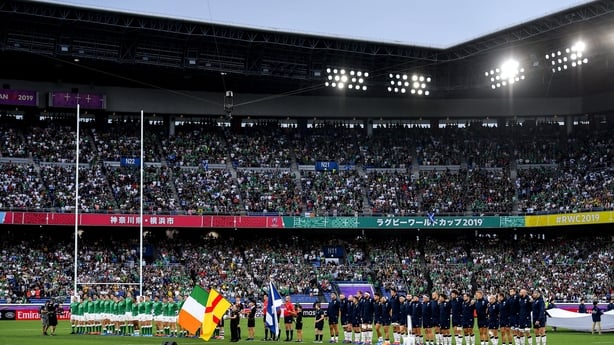
Pools
Pool A: Japan, Ireland, Scotland, Samoa, Russia
Pool B: New Zealand, South Africa, Italy, Namibia, Canada
Pool C: England, France, Argentina, Tonga, USA
Pool D: Wales, Australia, Fiji, Georgia, Uruguay
Ireland
It was an all too familiar tale for Ireland, who bowed out at the quarter-final stage for the seventh time in nine World Cup renewals.
Once again, the Irish report card would read 'Peaked too soon’ after failing to convert their stunning 2018 form into 2019, as Joe Schmidt ended his tenure on a sour note despite history showing him to be the country’s most successful coach.
Having thrashed South Africa in November 2017 and won a Grand Slam in 2018, expectations around Ireland grew to heights we’d never seen before, particularly after a Test series win against Australia and a victory over the All Blacks to round off the year (below).
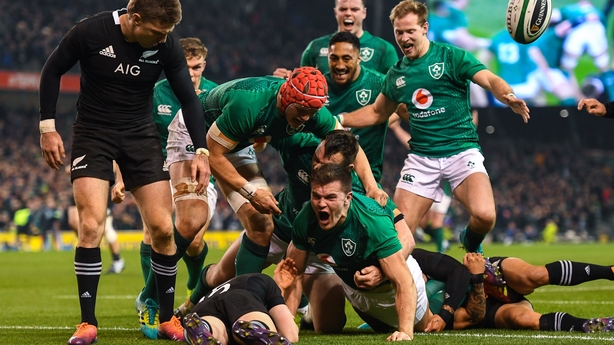
Entering the 2019 Six Nations, they were exactly where they wanted to be, and with a favourable World Cup draw of Scotland, Japan, Russia and Samoa, many were already mapping Ireland’s route to a first ever World Cup semi-final.
That Six Nations hit Ireland like a tonne of bricks though. They were thoroughly outplayed against England at the Aviva Stadium in their opening game, before a pair of unconvincing wins against Scotland and Italy.
In Round 4 they produced their best performance of the championship to beat France 26-14, with the scoreline flattering the French, but any confidence that had been restored was quickly swept away with a dismal 25-7 defeat to Wales in the final round, as Warren Gatland’s side won the Grand Slam.
There was still hope that Ireland would be able to turn things around for the World Cup, but when they returned from a week of intense pre-season training in Portugal to get hammered 57-15 by England at Twickenham in their second warm-up game, it was officially panic time.
Two wins against Wales followed in their remaining warm-up games, and they were somehow enough to lift Ireland to first place in the world rankings as they entered the tournament. Anybody who had watched them in the previous eight months knew that the rankings were telling a lie.
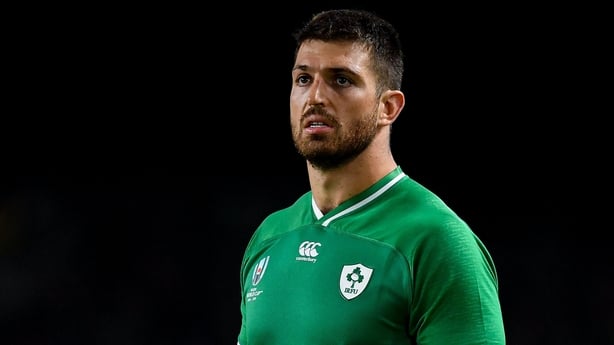
Sandwiched between those wins against Wales was the squad announcement, which provided a big shock as Jean Kleyn was selected ahead of Devin Toner in the second row. The Munster lock played five times across the warm-up games and World Cup, and will now be featuring for his native South Africa in 2023.
There were dark clouds hanging over Ireland heading into the opening game against Scotland in Yokohama, but they quickly passed. Three first half tries saw Ireland build up a 19-3 lead at the break, and after they eventually saw out a 27-3 win, the bandwagon was up and running again.
In their second game Ireland went up against hosts Japan, and while Jamie Joseph’s side had been talked up as a dark horse to reach the knockout stage, their 30-10 win against Russia in the opening game implied there wasn’t much to fear.
Just like against Scotland, Ireland came out hot against Japan with tries from Garry Ringrose and Rob Kearney giving them a 12-3 lead after just 21 minutes, and it looked like they were heading towards another impressive win.
Looking back now, the Kearney try was when Ireland’s tournament peaked. Japan chipped away at the lead with a couple of Yu Tamura penalties, and by the hour mark they had gone in front with a Kenki Fukuoka try as Ireland looked to be wilting in the humidity.
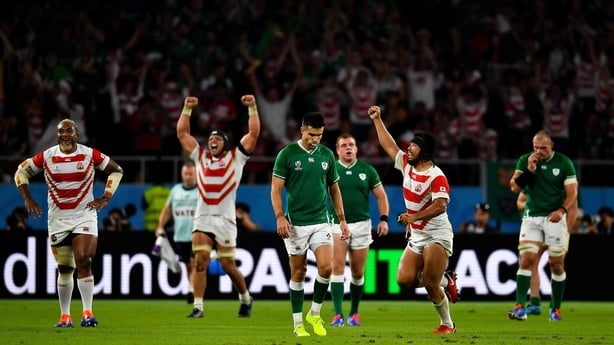
A further Tamura penalty sealed one of the most famous wins in Japan’s history, as Ireland were left grateful for a losing bonus-point thanks for a late try-saving tackle from Keith Earls.
Comfortable wins against Russia and Samoa followed as Ireland qualified for the quarter-finals in second place behind Japan, who topped the pool. Confidence had plummeted since that opening win against Scotland, while they would be without Bundee Aki for their last-eight meeting with New Zealand after his red card during the victory against Samoa.
The build-up to the game against the All Blacks summed up how Ireland had fallen, as fans scrambled to swap the tickets they had bought for the other quarter-final on the assumption Ireland would have topped their pool. Those who did make it to the game travelled in hope rather than expectation, but that hope didn’t last long. New Zealand were 22-0 in front by half time as they swept Ireland aside, before coasting to a 46-14 win.
Ireland had been put out of their misery.
"You’re looking back but I think a very, very small level of complacency has to have kicked in," Rory Best said later that year.
The Ulster captain retired after the World Cup, and on reflection thinks Ireland believed too much of their good press from 2018.
"You might be talking only 1% from each player but 1% added up over 30-odd players, at that level, can make a big difference.
"I think we believed what everyone was saying, and you know, you’re very quick to go ‘don’t believe what they’re saying’ when it’s negative, but you’re never as quick to say it whenever it’s positive."
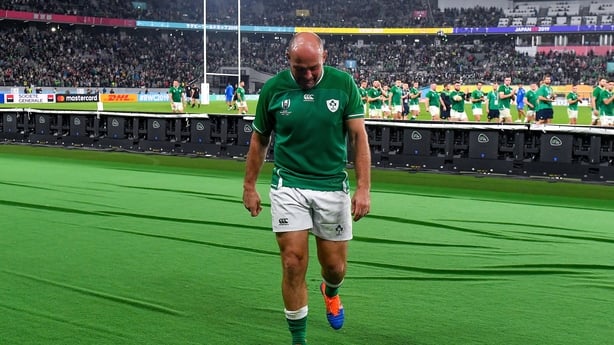
Ireland squad: Rory Best (capt), Sean Cronin, Niall Scannell, Rob Herring*, Tadhg Furlong, Cian Healy, Dave Kilcoyne, Andrew Porter, John Ryan, Tadhg Beirne, Iain Henderson, Jean Kleyn, James Ryan, Jack Conan, Jordi Murphy*, Peter O’Mahony, Rhys Ruddock, CJ Stander, Josh van der Flier, Luke McGrath, Conor Murray, Jack Carty, Joey Carbery, Johnny Sexton, Bundee Aki, Chris Farrell, Robbie Henshaw, Garry Ringrose, Andrew Conway, Keith Earls, Jacob Stockdale, Rob Kearney, Jordan Larmour.
* Rob Herring and Jordi Murphy were called up as injury cover for Sean Cronin and Jack Conan respectively
Results
Pool A: Ireland 27-3 Scotland (22 September – International Stadium, Yokohama)
Pool A: Japan 19-12 Ireland (28 September – Shizuoka Stadium Ecopa, Fukuroi)
Pool A: Ireland 35-0 Russia (3 October – Kobe Misaki Stadium, Kobe)
Pool A: Ireland 47-5 Samoa (12 October – Fukuoka Hakatanomori Stadium, Fukuoka)
QF: New Zealand 46-14 Ireland (19 October – Tokyo Stadium, Chofu)
Two years out from winning their third World Cup, South Africa looked lightyears away from becoming world champions again.
The Springboks were in crisis in 2017, which led to them raiding Munster to bring in Rassie Erasmus and Jacques Nienaber. Their 38-3 hammering against Ireland at the Aviva Stadium that November showed just how much work they would have to do.
Erasmus was initially brought into a helicopter role as director of rugby, and a few months later had to step in as head coach following the sacking of Allister Coetzee.
Even through 2018, their form was up and down, winning a Test series against England and beating New Zealand away from home, while on the other hand losing to Argentina and Wales.
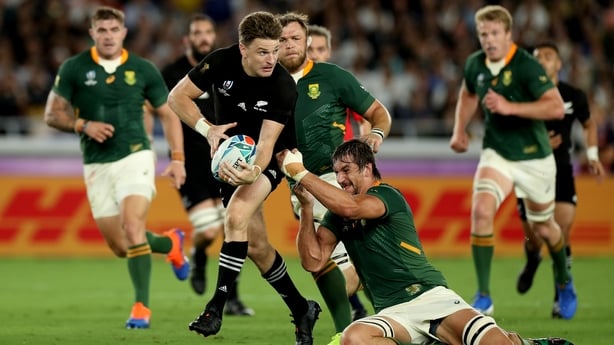
As the World Cup approached though, they were starting to click and after winning the Rugby Championship they were viewed as a dark horse for the title, although still some way off the favourites New Zealand who they would meet in the pool stage.
Japan were the story of the pool stage, and rightfully so.
Having caused a shock in 2015 win a famous win against the Springboks, the Brave Blossoms had set a bigger target ahead of hosting the tournament in 2019. Under Kiwi coaches Jamie Joseph and Tony Brown there were bigger expectations around them, and many tipped them to turn over one of Ireland or Scotland and sneak into the quarter-finals. We didn’t expect them to do both.
Having already beaten Russia, Ireland and Samoa they saved their best for their final pool match against Scotland, scoring four tries to win 28-21 and leapfrog Ireland to the top of the pool.
That game against Scotland was surrounded in controversy. As Typhoon Hagibis swept across the country it looked like the game was in danger of being cancelled, which would have resulted in a 0-0 draw which would have seen Japan qualify at the expense of the Scots.
Scottish rugby chief Mark Dodson threatened legal action if the game didn’t get rescheduled, but it didn’t come to pass. After a safety inspection, it was allowed to be played as scheduled, and the hosts claimed another famous win to set up a quarter-final with South Africa.
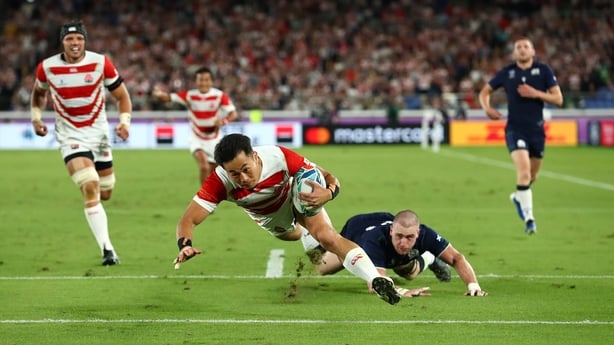
Typhoon Hagibis ultimately saw three games cancelled at the tournament; the Pool B meetings of New Zealand and Italy, and Canada against Namibia, as well as the Pool C game between England and France. More than 100 people were killed in the typhoon, one of the strongest to have hit Japan in decades.
England’s cancelled game against France saw them qualify top of Pool C ahead of the French, who looked like a side already in planning-mode for their own hosting of the World Cuip in 2023.
Wales came out on top in a competitive Pool C with four wins from four, as Warren Gatland’s side laid down a mark with an impressive 29-25 victory against Australia. The biggest one-off result from the early rounds came in Kamaishi, as Uruguay claimed an inredible 30-27 win against Fiji.
New Zealand’s hammering of Ireland set up a semi-final with England, who had also been through a one-sided quarter-final with Australia, winning 40-16.
Eddie Jones’ side had been slowly building through the tournament, but were still considerable underdogs against an All Blacks outfit who looked to be powering towards a third title in a row.
England produced a masterclass in Yokohama that day, bringing a level of physicality that New Zealand had no answer for. Manu Tuilagi’s try on two minutes gave them the ideal platform, and from there they managed their lead smartly.
Penalties from George Ford saw them extend their lead out to 13-0 early in the second half, and while Ardie Savea’s try gave the defending champions some brief hope, two further Ford penalties allowed England see out their best win of the Eddie Jones era.
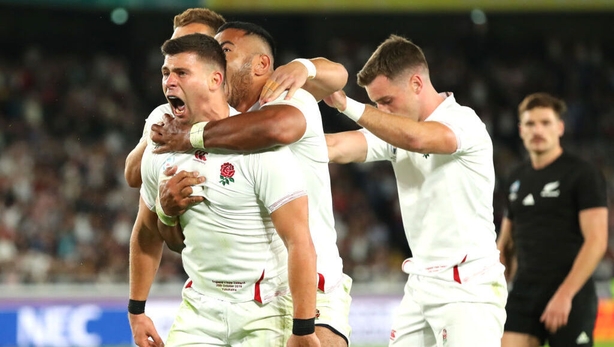
Standing in their way would be South Africa who were making their way through the tournament with a robotic efficiency. After ending Japan’s great run to the quarter-finals, Rassie Erasmus’s side edged past Wales 19-16 in a game that was far less exciting than the scoreline would suggest.
England couldn’t repeat their semi-final heroics in the decider, beaten by a ruthless Springbok side in what had been a repeat of the 2007 final.
An injury to Kyle Sinckler after just two minutes saw them struggle in the scrum, and it was South Africa’s strong setpice platform that was the foundation to their win. Four Handre Pollard penalties saw them build up a 12-6 half-time lead, which had become 18-12 as the sides hit the hour mark.
In the final quarter, the Boks flexted their muscles. Makazole Mapimpi’s try on 66 minutes effectively killed the game off, with the Sharks winger becoming the first South African try-scorer in a World Cup final, despite the country being two-time champions before that. Cheslin Kolbe’s score five minutes from time was enough to pop the champagne corks, as South Africa rounded off a 32-12 win, becoming world champions for a record-equaling third time.
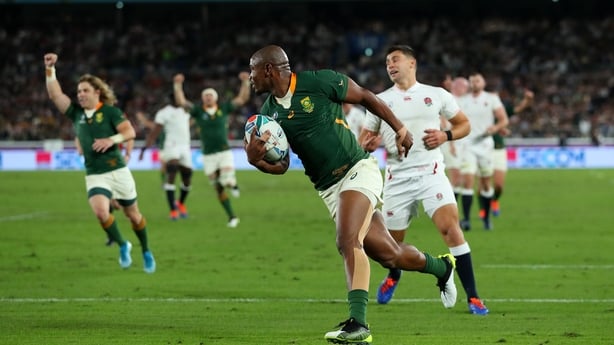
Top points scorers:
Handre Pollard (South Africa): 69 points
Owen Farrell (England): 58 points
Richie Mo’unga (New Zealand): 54 points
Top try scorers:
Josh Adams (Wales): 7 tries
Makazole Mapimpi (South Africa): 6 tries
Kotaro Matsushima (Japan): 5 tries
Listen to the RTÉ Rugby podcast on Apple Podcasts, Soundcloud, Spotify or wherever you get your podcasts.
Listen to live coverage of all of Ireland's Rugby World Cup games on RTÉ Radio or follow our live blogs on RTÉ.ie and the RTÉ News app.
Watch live coverage of Ireland v Tonga (Saturday 16 September) and South Africa (Saturday 23 September) on RTÉ2 and RTÉ Player.








